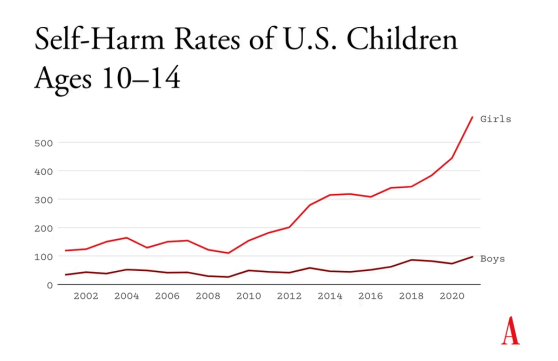






Jonathan Haidt: Schools Should Ban Phones, Give Kids The Let Grow Experience and Play Club
In his blockbuster Atlantic piece out today, “The Terrible Costs of a Phone-Based Childhood,” Let Grow Co-founder Jonathan Haidt says our culture gets it all wrong when it comes to kids: We “underprotect” them in the virtual world, and over-protect them in the real one.
That’s the worst of both worlds, if we want to raise healthy, happy kids.
What happens when we underprotect kids in the virtual world
The piece focuses heavily on how smartphones, introduced about 15 years ago, have “re-wired” childhood. They did this in part by throwing kids (and the rest of us) into a maelstrom of “likes,” comparisons, and misinformation. But phones also warped childhood by siphoning off the time kids would otherwise spend in the real-world, running around, playing, flirting, exploring, and even sleeping. These are things kids NEED but aren’t getting enough of.
Result? A generation of young people ever more depressed, anxious, and harming themselves, says Haidt. His graphs will strike fear in any parent’s heart:

But Haidt doesn’t just decry. He proposes four solutions. Three are about phones: Get them out of schools, from arrival till dismissal. Don’t let kids have a smartphone till age 14. And keep everyone off social media till age 16.
Don’t overprotect kids in the real world
His fourth and final plea? Give kids back some independence and free play. To do that, he says, schools and parents should look to the organizations working to promote a more play-filled, independence-building childhood. Specifically:
One that I co-founded, at LetGrow.org, suggests a variety of simple [free] programs for parents or schools, such as play club (schools keep the playground open at least one day a week before or after school, and kids sign up for phone-free, mixed-age, unstructured play as a regular weekly activity) and the Let Grow Experience (a series of homework assignments in which students––with their parents’ consent––choose something to do on their own that they’ve never done before, such as walk the dog, climb a tree, walk to a store, or cook dinner).
Let Grow’s ideas work for individuals as well as schools. Here’s our Let Grow Independence Kit, which is an “at-home” version of The Let Grow Experience, And voila our Pledge of Independence. Take it and we’ll send you one independence-building activity a week for 10 weeks. All our materials for schools and parents are free.
Don’t only focus on phones and social media
As Haidt says:
It would be a mistake to overlook this fourth norm. If parents don’t replace screen
time with real-world experiences involving friends and independent activity, then
banning devices will feel like deprivation, not the opening up of a world of
opportunities.
Agreed!



I would caution against taking what Haidt says as gospel. Fellow LG co-founder Peter Gray came to a completely different conclusion from his review of the literature, finding that evidence of tech being bad for youth was weak to non-existent. Haidt is cherry picking studies and/or overstating very small effects. Ironic that LG rails against IRL boogeymen but eats up the tech one hook, line, and sinker. Please don’t parent based on these alarmisms any more than the ones regarding real life.
I find it ironic that LG advocates for trusting kids and treating them more like adults in the real world but supports Haidt’s (who I realize is a co-founder of LG) agenda to restrict their tech use and activities in the virtual world. You guys somehow have a rational view on every risk except for tech where you toe the mainstream line and parrot the same alarmism that is everywhere nowadays. How are people handling the cognitive dissonance? It seems like Lenore and the LG people hold a romanticized ideal of childhood in the pre-internet era; it wasn’t all rainbows and butterflies back then either and old school parenting had its share of flaws that I don’t think should be resurrected. I see no reason we can’t have the best of both worlds and see the outdoor freedom of the past and modern tech as complementary rather than in conflict. Peter Gray, another LG co-founder, came to a completely different conclusion from his review of the supposedly anti-youth tech use research. Spoiler, he found the anti-tech evidence in the literature to be weak to non-existent. Haidt is doing some cherry picking and/or overstating very small effects. I wonder why LG is only sharing Haidt’s work and not Gray’s.
Kassandra gets right to the point, and it’s a great question. Lenore and LetGrow are doing great work to try to bring wholesome and energetic activities to kids, but I think a lot of us caregivers are craving a more comprehensive solution. That is, what do you do when you have two teenagers with smart phones now, and three younger ones on the way? How do you help to sensitize your kids to making balanced choices and build a transition to new expectations. This talk of “banning” phones makes me uncomfortable. Thanks for any resources (books, blogs, articles) folks can recommend!
What now?! How can we get the cell phones out of schools?!
My children were born in 2001 and 2004 and they describe themselves as the guinea pigs generation. They wish they’d never had access to the internet. As parents, we were fairly blindsided by the creeping in of screens (what harm could an iTouch do?), and in retrospect we would have done things differently. Their brains are certainly wired differently due to the lifelong tech exposure. I’m not sure my son would have ADHD and executive function disorder if he’d not been exposed for so many years during his tweens and teens.
Since reading Mr. Haidt’s piece in the Atlantic (thank you, Scott Galloway), I’ve been telling everyone about it. Especially friends with young children. There’s hope for the next generation if action is taken, but awareness and data review are the first steps.
When I was a kid it was tv. I wanted to sit and watch reruns of “The Rifleman”, “Sea Hunt”, and “The Jack Benny Show” every afternoon after school. Fortunately, my parents said I could only watch one–half an hour of screen time–then I had to go outside. Of course I complained and resented their ruling because I was a kid. But today I’m glad they were in charge.
If I was raising a child now, I’d give him or her the simplest, “dumbest” phone available, to be used only for a voice call in an emergency. Of course, the kid would be sore about it, but would thank me someday, just as I thank my parents now the the rules and discipline they maintained when I was young.
Finally, kids don’t need organizations, programs, clubs, sign-ups, or kits in order to play. If those things are involved, it isn’t truly “free-range”. All they need is “okay, be careful, and be home before dark.” It worked for millennia, and it would still work today.